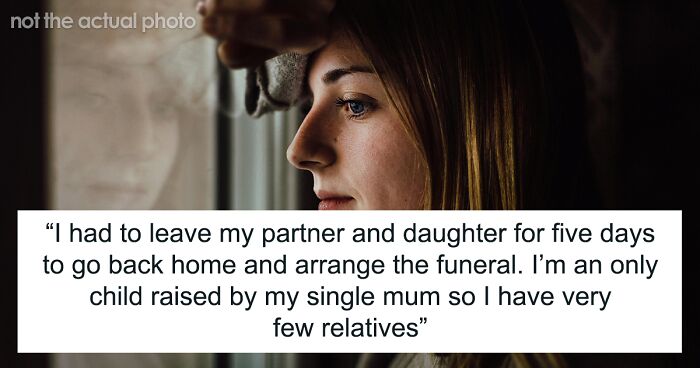
Woman Whose Mom Passed Feels It’s Bizarre MIL Didn’t Reach Out At All, Thinks Of Cutting Her Off
Interview With ExpertDeath is often an uncomfortable topic to think about, let alone discuss. When someone passes away, the people around generally don’t know what to do or how to address the situation. This can be painful for the grieving family who are just looking for some support during a tough time.
A woman found herself in this situation after suddenly losing her mom. She was devastated by the loss and also incredibly hurt that her mother-in-law did not reach out to comfort her at all. It made her question their entire relationship.
More info: Mumsnet
Some people feel uncomfortable reaching out to a bereaved person and often don’t know exactly what to say to them
Image credits: Pavel Danilyuk / Pexels (not the actual photo)
The woman, who is an only child of a single mother, explained that her mum passed away unexpectedly around four weeks ago, and she had to manage the funeral arrangements alone
Image credits: Roman Pohorecki / Pexels (not the actual photo)
Her partner had informed his mother about the situation, and she asked him to pass on her condolences
Image credits: Kindel Media / Pexels (not the actual photo)
The grieving woman was shocked that her mother-in-law didn’t reach out personally or check in to see how she was doing
Image credits: Popandcrackle
The poster felt extremely hurt by her mother-in-law’s behavior and wondered if she should cut her off over the lack of empathy
The woman had shared that her partner’s mom tended to be reclusive and distant at times. Despite that, both the women got on well with each other, and the mom-in-law used to even babysit the OP’s daughter twice a week till she was four. It might seem strange that someone so close would not show their support to a loved one in their time of grief.
To understand why death has such an effect on people, Bored Panda reached out to Jill Cohen, a grief counselor who works with children and adults, to get her perspective on the situation. She said that “generally, people don’t know what to do with grief and with grievers.”
“Death is a circumstance that cannot be fixed. Nobody can bring the deceased back, so people feel helpless as if there is nothing they can do about it. They don’t know what to say or do so as not to upset the griever. Usually, however, people do try to reach out, even if only by text, to check up on friends or relatives who have experienced a loss.”
“Different people’s personalities also weigh in on how they react to the griever. If they are a reserved person to begin with, they may be reserved in this behavior, too. If they are anxious or insecure, they may fear doing or saying the wrong thing. They may even think that enough people are supporting the griever without their involvement, so no need to step in,” Jill explained.
It’s possible that the mother-in-law felt intimidated by the gravity of the situation and wasn’t sure exactly how to comfort her daughter-in-law. That’s why she told her son to convey her condolences instead.
Jill Cohen told us that “if a person feels uncomfortable with death, they can be the person that offers some ‘lightness’ to the other during the mourning time. Offer to do a spa day, suggest a comedy movie, go for coffee, or lunch or on a shopping spree, to give them something different to do rather than just settling into their grief at home.
“The bottom line is that even if you are uncomfortable with dealing with death if the relationship you have with the grieving person is a meaningful one, understand that it’s ‘not about you.’ You may have to move a little bit out of your comfort zone to be present and show up for your friend as he/she wants or needs you to be,” Jill shared.
Image credits: Juan Pablo Serrano / Pexels (not the actual photo)
Dealing with grief alone often feels scary and painful. A survey found that almost 50% of grievers are able to cope better after spending time with family. It’s also probably why the OP was hoping for her mom-in-law to reach out and comfort her. Especially after losing her mum as an only child, her partner’s mother was probably the only maternal figure she had left.
That’s why we asked Jill if she could share tips for people who want to be there for a person during their time of grief. She said that “people can help grievers by taking care of tasks or activities that the griever is too tired, sad, or unmotivated to do.” Some of these include:
- “Sending over a housekeeper to do some household chores.
- Sending a babysitter to watch the children, if there are any, so that parent(s) can rest.
- Go grocery shopping for household staples for them.
- Cook or have meals delivered so that the household gets proper meals for a while, while mourning.
- Mow the lawn, clear snow from their steps, and make the trip to the dump for them to recycle.
- Help organize their mail with the priority items that need to be taken care of (bills, items associated with death, funeral, etc.) so that they don’t go by the wayside.”
A few other general suggestions Jill had were: “Offer to go for a walk. Fresh air is helpful, and you can be present while walking, without talking, if preferred. Or go and sit with them, in silence or with the TV on. Bear witness to their grief quietly. Presence is important. Respect their boundaries. If they say that they are not having a good day and don’t want company, honor that.”
Death can bring out a weird side of people that you would have otherwise not seen. The OP, in her fragile state, unfortunately, had to deal with her in-law’s possible discomfort as well. Although she did later add that her expectations for her mother-in-law were probably out of line, we hope the other lady eventually reached out to show support.
People were sensitive to the poster’s pain and told her that her partner’s mom was probably uncomfortable with death and didn’t know how to handle such a situation appropriately
Poll Question
Thanks! Check out the results:
I don't think it's fair to attribute this to malice OR MIL having issues with death. OP is fogged by her own overwhelming grief and need for comfort, and not seeing that her expectations of what nice people do are very subjective. the MIL did send her condolences. I get she wants emotional support, but in what form? If MIL is more reserved and reclusive, she might be happy to help OP if OP asks, but cautious about "intruding" into OP's time of grief. To a more reserved person, being bombarded with well wishers would be a painful imposition. MIL might think she is being respectful by giving OP space instead of forcing OP to talk to her about the same painful topics. If OP reached out to the MIL and explained she needed a kind ear or help with something, I bet MIL would be happy to lovingly support her. Remember folks, what you want people to do or what you would do is not some universally understood "right" way.
See, if this were me, and my partner's mother passed, and I knew she was feeling sensitive about my own mother's reaction, I would send my mother a text message telling her that my partner is very down and it might be nice of my mom to just reach out to her personally. I don't understand why the husband....didn't do that?
I can be like this about death of others close family. I may ask a general, how are you but I won't bring up the dead person, no way. It's because I feel like if the other person is in a place where they are coping and I then say something, I can set them back to the grieving cycle and make their day harder to get through. I also don't know how many others have already asked and it can be depressing to have to keep revisiting the death so many times over and over. I often wondered if I was wrong but then my brother died and I would tear up whenever anyone asked how I was doing. My dad then died and it was the same. I discovered I treat others how I want to be treated when grieving and though others are different in the needs and responses it's just sincerely how I feel. So I no longer feel guilty or question my nature.
One of the hardest parts of my mom's passing was the constant calls and messages about her health or their condolences. Like, I get it, is polite to do it, but damn I wanted to burn my phone. Sometimes is TOO much and you just want to grieve in peace. Btw, my boss's mom is in very bad health and I texted him yesterday "Hey ____, just a little word: IT'S OK to say 'I don't want to talk about it, maybe another day' when asked about your mom's health. I know it's overwhelming. That's it, you don't have to answer this messsage, have a good night"
Load More Replies...I don't think it's fair to attribute this to malice OR MIL having issues with death. OP is fogged by her own overwhelming grief and need for comfort, and not seeing that her expectations of what nice people do are very subjective. the MIL did send her condolences. I get she wants emotional support, but in what form? If MIL is more reserved and reclusive, she might be happy to help OP if OP asks, but cautious about "intruding" into OP's time of grief. To a more reserved person, being bombarded with well wishers would be a painful imposition. MIL might think she is being respectful by giving OP space instead of forcing OP to talk to her about the same painful topics. If OP reached out to the MIL and explained she needed a kind ear or help with something, I bet MIL would be happy to lovingly support her. Remember folks, what you want people to do or what you would do is not some universally understood "right" way.
See, if this were me, and my partner's mother passed, and I knew she was feeling sensitive about my own mother's reaction, I would send my mother a text message telling her that my partner is very down and it might be nice of my mom to just reach out to her personally. I don't understand why the husband....didn't do that?
I can be like this about death of others close family. I may ask a general, how are you but I won't bring up the dead person, no way. It's because I feel like if the other person is in a place where they are coping and I then say something, I can set them back to the grieving cycle and make their day harder to get through. I also don't know how many others have already asked and it can be depressing to have to keep revisiting the death so many times over and over. I often wondered if I was wrong but then my brother died and I would tear up whenever anyone asked how I was doing. My dad then died and it was the same. I discovered I treat others how I want to be treated when grieving and though others are different in the needs and responses it's just sincerely how I feel. So I no longer feel guilty or question my nature.
One of the hardest parts of my mom's passing was the constant calls and messages about her health or their condolences. Like, I get it, is polite to do it, but damn I wanted to burn my phone. Sometimes is TOO much and you just want to grieve in peace. Btw, my boss's mom is in very bad health and I texted him yesterday "Hey ____, just a little word: IT'S OK to say 'I don't want to talk about it, maybe another day' when asked about your mom's health. I know it's overwhelming. That's it, you don't have to answer this messsage, have a good night"
Load More Replies...
 Dark Mode
Dark Mode 

 No fees, cancel anytime
No fees, cancel anytime 













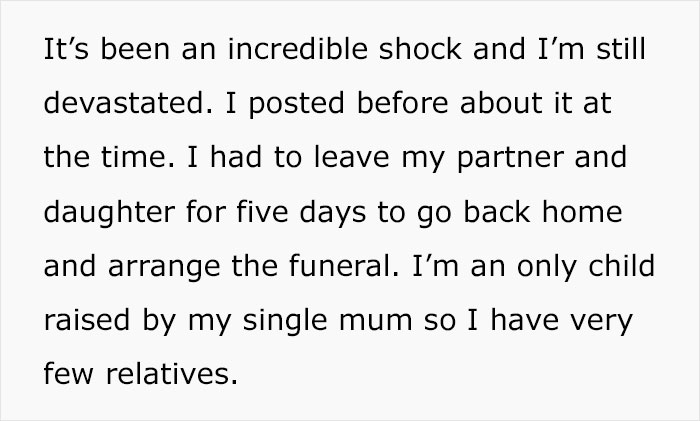
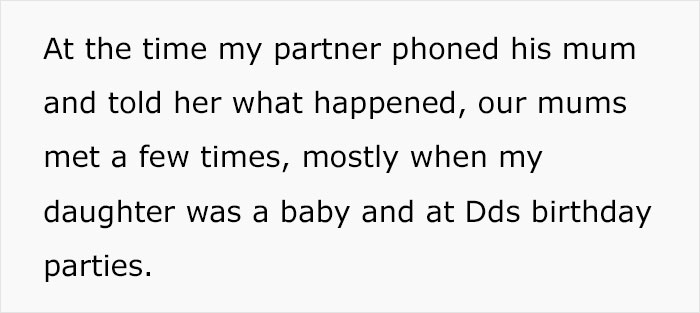


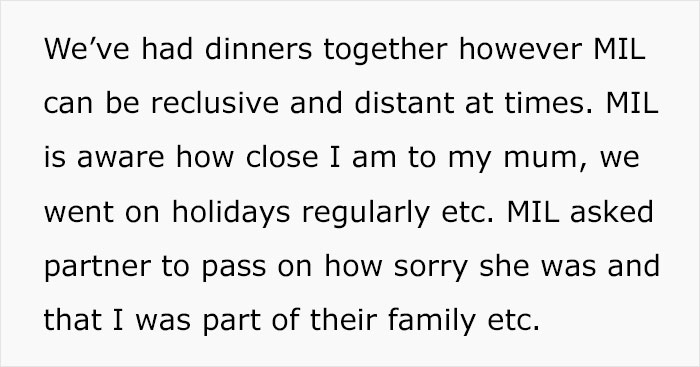
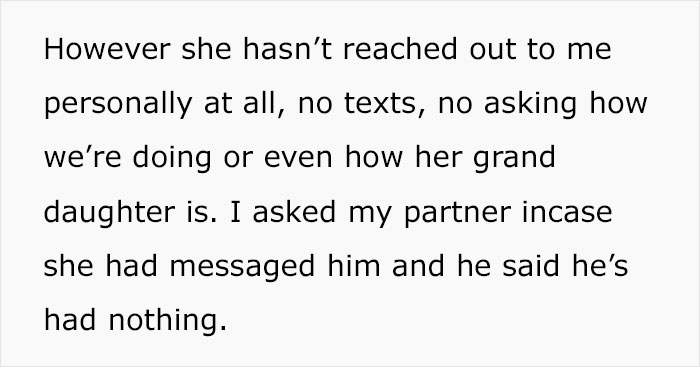

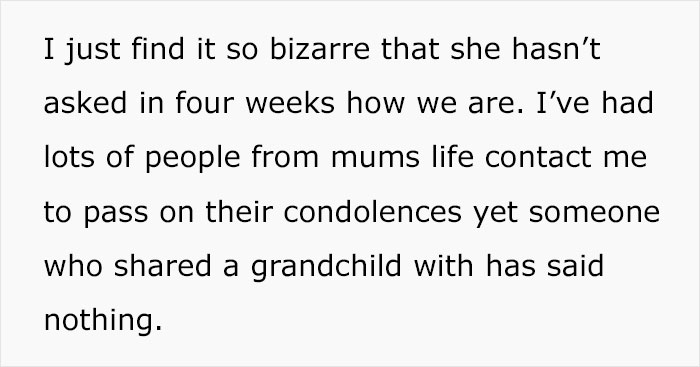
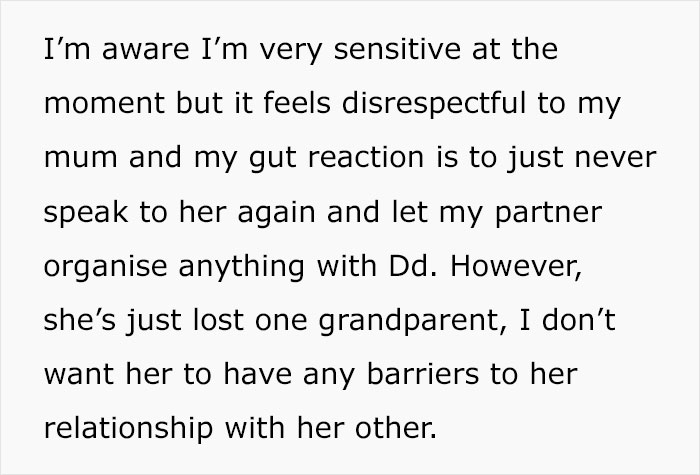
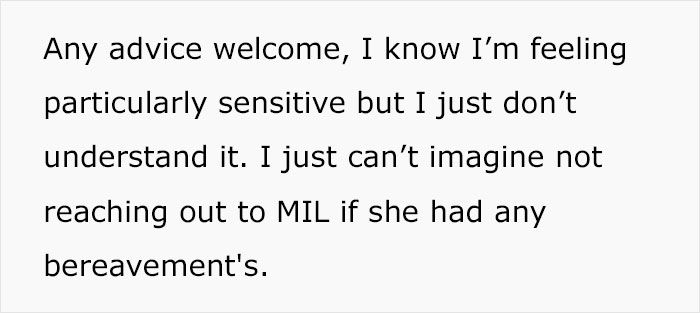
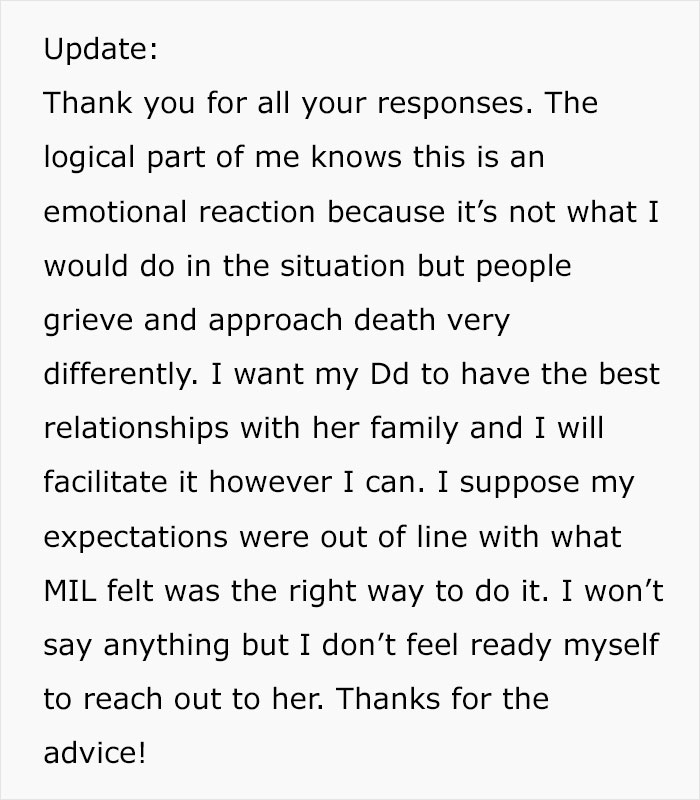
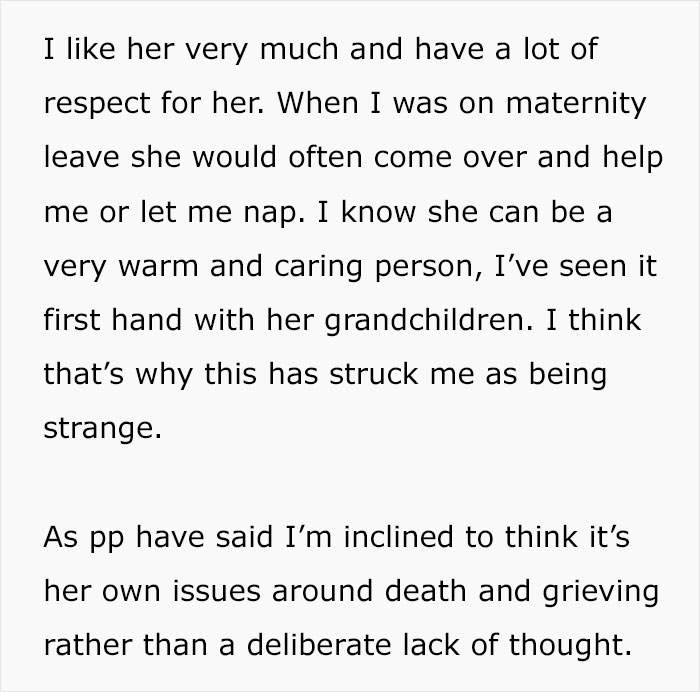
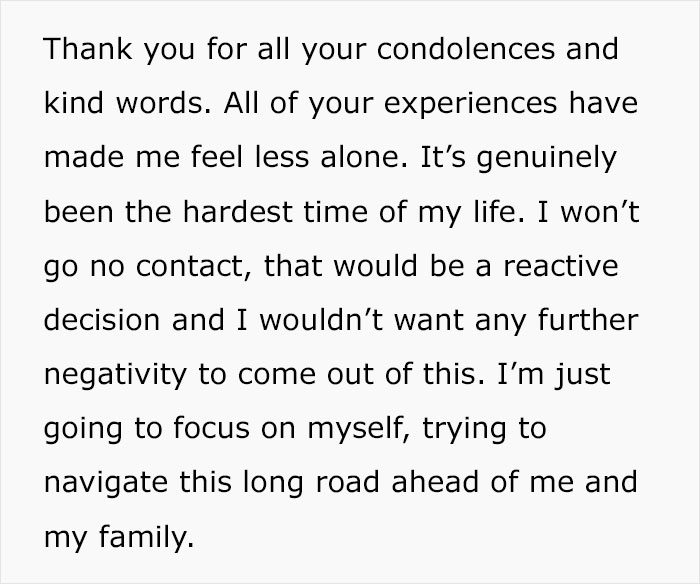

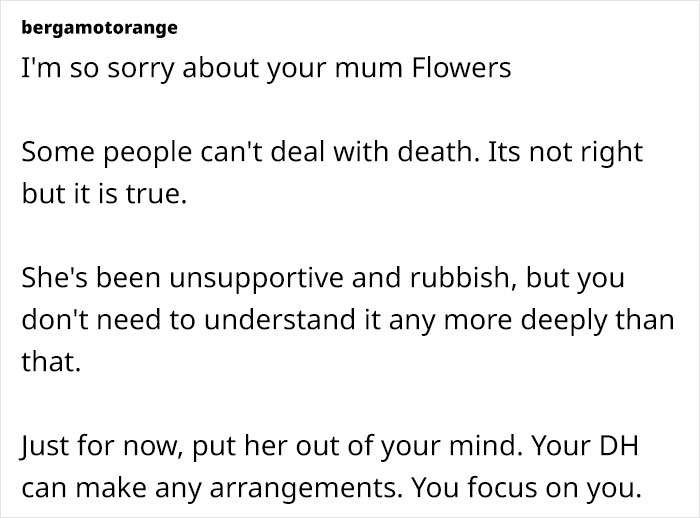

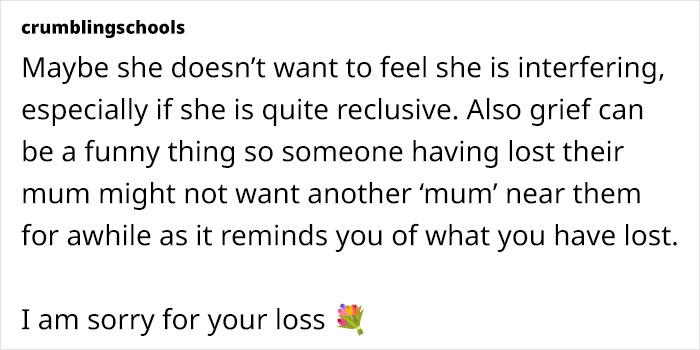

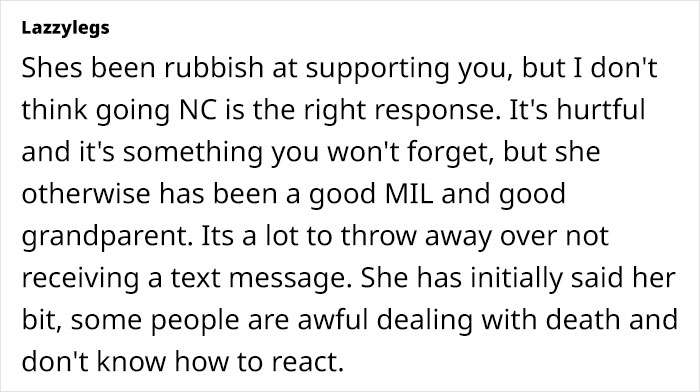












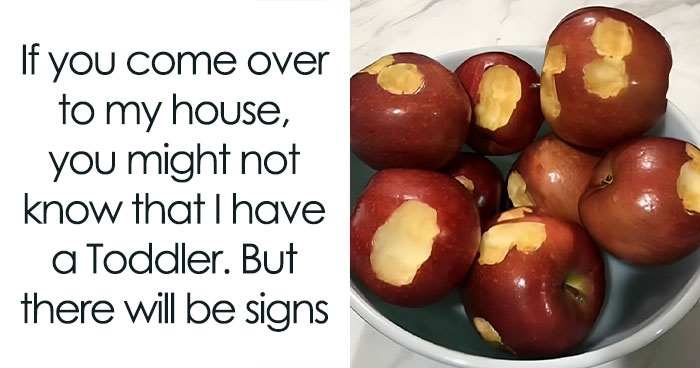

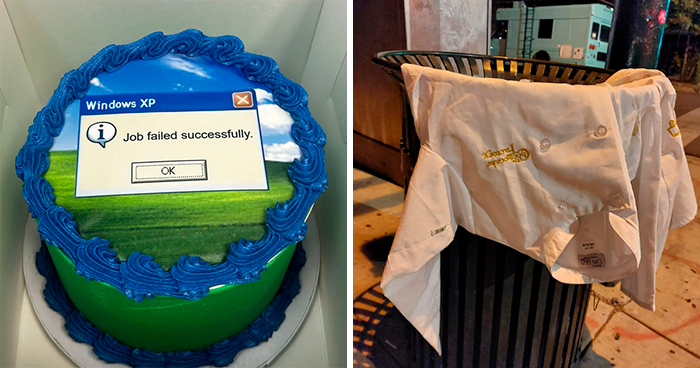




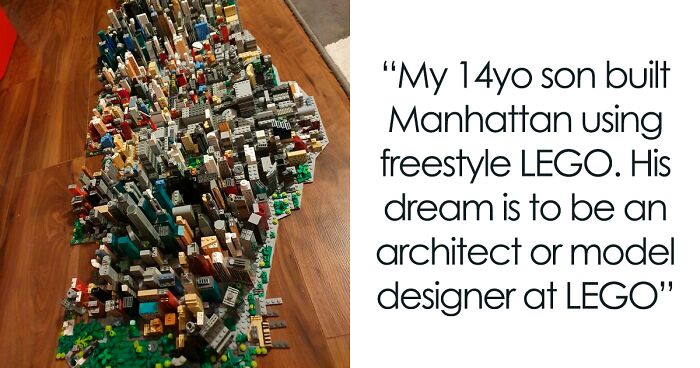




12
6